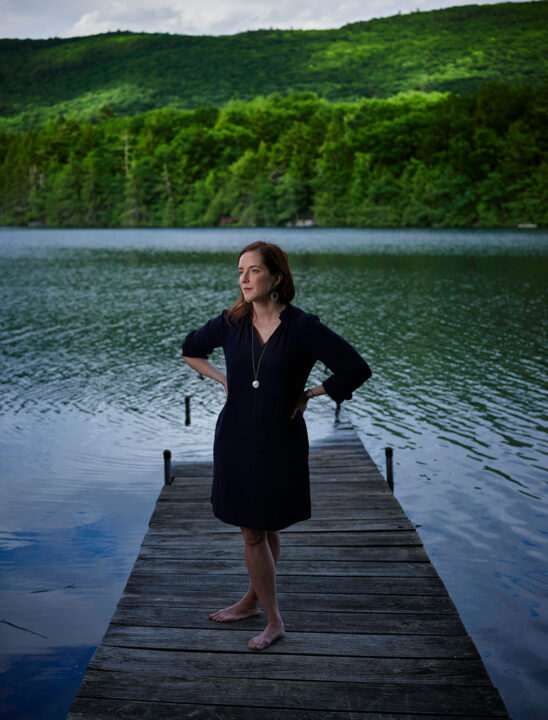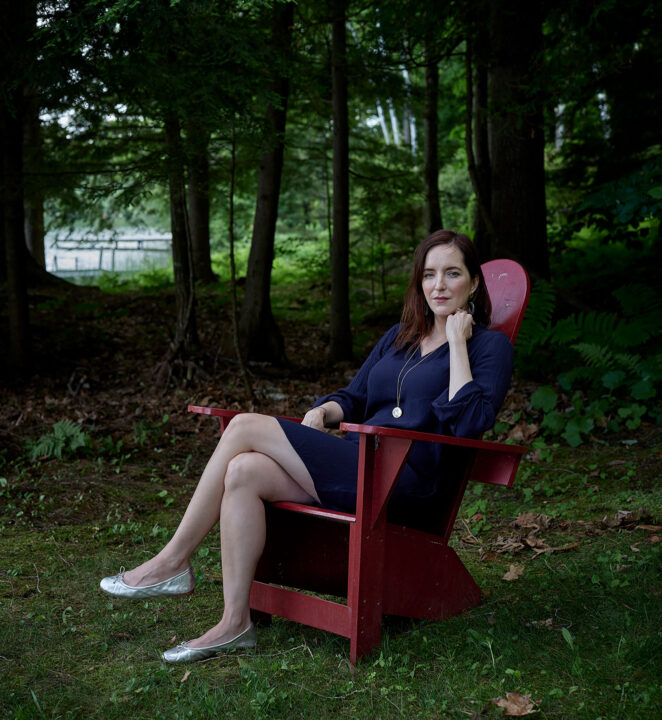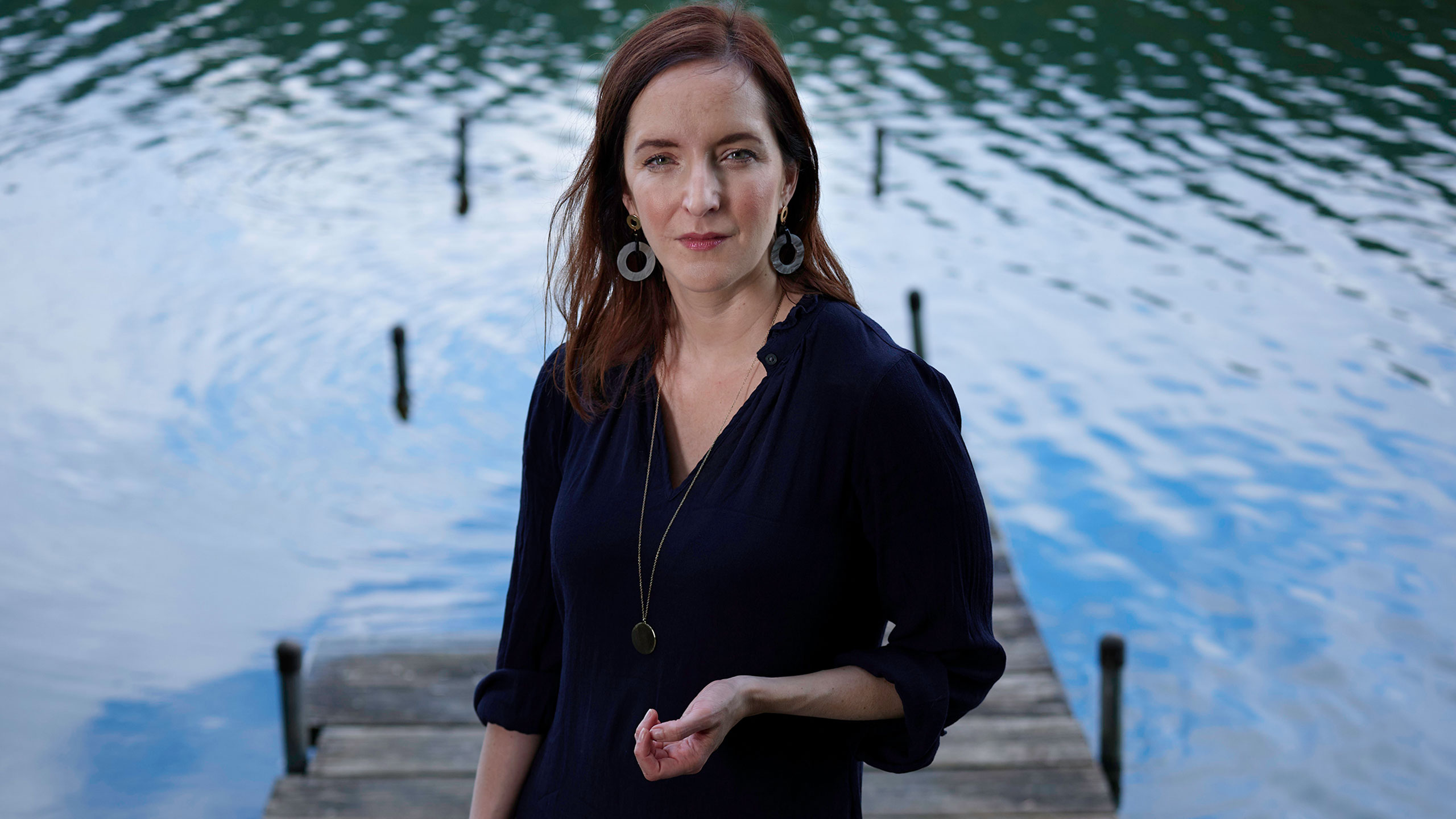Before we get started, here are some things you should know about Rebecca Makkai: she earned her master’s degree from the Bread Loaf School of English in 2004, during which time she was an elementary teacher at a Montessori school.
Both of her parents are linguists, and she spent childhood summers traveling with them to academic conferences. Her Hungarian father is also a poet, her paternal grandmother was a novelist, and there is a history of smuggling in the family.
Makkai made her literary debut as a writer of short stories; for four consecutive years—from 2008 to 2011—her work was anthologized in the annual Best American Short Stories. During this time, she was also working on her first novel; The Borrower was published to great acclaim in 2011. Another novel (The Hundred-Year House, 2015) and a collection of short stories (Music for Wartime, 2016) followed—and then, The Great Believers, which was published last year.
An epic story of friendship and heartache and loss that takes readers from 1980s Chicago during the dawn of the AIDS crisis to contemporary Paris and back again (and again and again), The Great Believers has been called “an absorbing and emotionally riveting story about what it’s like to live during times of crisis.” These words were written by novelist Michael Cunningham in a rave review that landed on the cover of the New York Times Book Review, and it was only the beginning of the acclaim that would come Makkai’s way.
The Great Believers was cited by the Times as one of the 10 best books of 2018; it was the winner of the Los Angeles Times Book Prize for Fiction and garnered a pair of awards from the American Library Association. It was a finalist for the 2018 National Book Award for Fiction—and the 2019 Pulitzer Prize for Fiction. It’s currently been optioned for television by Amy Poehler’s Paper Kite Productions.
A few other things: she met her husband, Jon Freeman, at Bread Loaf; in fact, he was the first person she encountered when her cab pulled up to the Inn on a July morning in 1999. He teaches at a boarding school in suburban Chicago, where the couple live with their two daughters and new puppy. Their summers are spent in Vermont, in a charming cabin on Fern Lake, which is where I sat down with Makkai on a warm day in early July for a freewheeling conversation that began in the morning and extended into the afternoon.
This interview, conducted by Matt Jennings, has been edited and condensed.

Growing up in Chicago, in a household with two linguists . . . what was that like?
It was a language-rich environment. My dad spoke Hungarian, and then someone would come over, and they would converse in Russian; it happened all the time. And then my parents ran an organization, the Linguistics Association of Canada and the United States. And we would go to those conferences every summer. Every year, it was a different university campus. And here’s the thing—linguists love to talk to children; they want to know how children process language. So I would have these amazing conversations with adults. Of course, I’d also want to find that one other kid who was there. But there weren’t many of us.
What were things like at home?
Our house was both a home and a publishing press; my parents were putting out mailings for this organization. They were publishing abstracts of all the presentations that had happened that year. And they also were publishing other linguistics books. So the whole house would be taken over by mailings, and I would get to help. We had a giant Xerox machine . . . I guess most people don’t have a Xerox machine in their home.
No.
[Laughs] It just occurred to me for the first time that that’s not a normal thing to have in homes.
Rebecca’s husband, Jon; their two daughters; and Matilda the puppy return to the cottage from the local farmers’ market. After a round of introductions and an exuberant greeting from Matilda, the conversation continues.
Tell me about your father. He fled Hungary in the 1950s?
Yeah. He escaped when he was 20, after the failed revolution in 1956. He was in a refugee camp at Camp Kilmer in New Jersey and eventually settled in Boston, where he talked his way into Harvard.
And he was a poet.
Yes, and still is. He’s since repatriated to Hungary, but he’s been publishing in Hungarian the whole time. Before the Iron Curtain fell, he couldn’t publish his work there. He’d have to smuggle it back in. In the 1970s, my parents sent this box of disposable diapers to my dad’s cousin, who had a baby. It looked legitimate, since disposable diapers were new in the U.S. at the time and not available in Hungary. But they had slit some of the diapers open and stuck poetry manuscripts inside.
And I read that your grandmother’s novels were smuggled out of Hungary . . .
By my mother! She and my father were dating, and my mom was in Europe and then traveled by herself to Hungary to meet my grandmother. And there were two manuscripts that my grandmother gave her, saying, “I can’t publish these here. Just get them out of the country.” They were on this very thin onionskin kind of paper. And so my mom put them in her girdle and smuggled the pages out of the country.
You’ve written about your family history in a series of short stories (published in Music for Wartime), in what you’ve called “fictionalized nonfiction.” Have you thought about a more extensive nonfiction treatment?
I have. I just keep getting overwhelmed by the size of the project and by . . . I speak very little Hungarian. It’s an incredibly difficult language. Basically, I’m in this unusual position where there’s 40 books that my grandmother wrote, but all in another language. So I’m going to, what, read 40 novels in Hungarian? Get 40 novels translated into English? How am I going to do this?
And translations depend on the translator, too, so it’s imperfect.
Right! The more realistic version is finding one book to work with someone on, be part of the translation process myself, and then write about that.
When you set out to write, how do you know what will be a short story and what, eventually, will be a novel?
It’s really the size of the idea. For instance, I have a story in my collection where this woman coughs up J. S. Bach and has a sexual affair with him. It’s a really weird story. I’m not going to sustain that for 300 pages! You probably don’t want to read that for 300 pages. To me, that’s a short story. I don’t have to examine the underpinnings of it too closely. There doesn’t really have to be too much of a plot even beyond that. I don’t have to come up with things for them to do. It just is. Right?
Right.
But with my first novel, The Borrower, I had this idea of this kid being put into anti-gay therapy and turning to someone for help, and she crosses this line [kidnapping him]. It felt like if I tried to do that as a short story, which I really wanted to do originally, how far am I going to get? It’s too big of a plot idea. It’s not the size of the themes. It’s literally the size of a plot. It’s too big for a short story.
When you have an idea for a novel, how long do you sit with that idea before you start to write?
Well, my first book, I poked at it forever because I wasn’t ready to write a novel. The second book—The Hundred-Year House—I poked at it for a while because it was a short story for so long until I realized it was a novel and not a short story. And with The Great Believers, it was probably about a year of kind of turning it around, writing small things, making notes, kind of . . . it feels like you’re walking around with this huge boulder being like, “How do I pick this up exactly? What’s my angle?”
And The Great Believers started out as a different book . . .
Yeah, it started off being about the art world in Paris before and after World War I; the initial story was this woman looking back from the end of her life on that time, which, mathematically, put her in the 1980s. But then I started thinking more about the ’80s and the art world, and I realized I had an opportunity to write about the AIDS epidemic, which is something I’ve been interested in for a very long time.
The more research I did, the more convinced I became that this world should be at the heart of the plot and not a subplot. I wanted the life of Yale Tishman, my protagonist, to be front and center.
Did you wrestle with whether this subject, this world was your story to tell?
That was the paralyzing fear; I worried about that for five years. I think it was really important that I went in utterly terrified—of getting this wrong and then of doing it at all.
If I was going to do it well, I needed to be convinced that I could talk to the right people, that I could avoid cliché, that I could be accurate down to the most granular level, that I could get the psychology right.
And then, secondly, there was this five-year question of, “Even if I do it well, does this do harm, or does it do good to the community most affected by this tragedy?” And, ultimately, my answer was the latter, or I wouldn’t have done it.
I’ve been able to do a lot of fundraising and activism around the book, which has been wonderful, but even before all that, there’s just the fact that the success of my book makes it that much more likely that publishers are willing to invest in a similar book, an LGBT voice, a book about the AIDS epidemic next year.
It’s not a zero-sum game. This is not like, “Oh, it’s been written. You can’t do it.”
I understand that your research was quite extensive.
It had to be. I had to get it right.
And there wasn’t a lot written about AIDS in Chicago . . .
Well, the archives of the Windy City Times, a gay weekly that was published in the ’80s, was a great resource, but primary sources were essential. In some cases, I was talking to people who really hadn’t spoken about it much, and in some cases, I was talking to people who had spoken about it quite a lot in interviews, but I was asking them super weird questions. I was asking them, “Where was the fish tank in the AIDS unit?” And so I think in many cases, I was prompting different memories for people, getting them out of their usual stories that they tell.
How did the research work with the writing? Did you do all the research up front and then write, or did you do both simultaneously?
Before I answer that, I’m gonna get some food. Can we get some food?
A few minutes later, Makkai emerges from the kitchen with a plate piled high with sliced cucumbers, bell peppers, a stack of crackers, a wedge of cheese, and a bowl filled with dill yogurt dip.
Research. I researched in layers. What I didn’t want to do was conduct all my research first, spend three years researching, not even knowing what I was looking for. But then I also didn’t want to write the whole thing and then figure stuff out later, which would have been a disaster.
Trying to go back and fill in the gaps . . .
Oh, God, what a nightmare. Can you imagine? How could you write without knowing exactly the timeline of how the disease would progress or how long it took to get tested or those things? And I would have made mistakes. I would have made horrible structural mistakes, honestly, not knowing. So it was really—it was just constant. Research. Write. Research. Write.
Yet as closely as you hew to reality, this is still fiction.
Whenever you start to write something, you make a contract with reality. This exists in the real world, this doesn’t exist in the real world. Wes Anderson’s contract with reality is different than David Simon’s contract with reality. Right? So we’re doing that constantly, and I had to make this very specific for this kind of story. Especially for me coming from the outside, it really wouldn’t have done justice to people’s lived histories to make up a city or talk about things that didn’t happen in Chicago.
This book has received so much acclaim. It’s probably best that it wasn’t your first novel.
No, no, no. I wouldn’t wish that on anybody.
But you will forever be [authoritative voice] “the author of The Great Believers.”
And that’s lovely. I think that part of it is still sinking in. There’s the sense that you don’t know to what extent a book is big in a given year and then everyone moves on, and to what extent does the book stay big and does it stay . . . does it get taught? Does it stay read? And that’s not something that we know.
Changing gears, let’s talk about Bread Loaf. Do you have vivid memories of that time?
Oh, absolutely. I remember the very first day, riding in a cab from the airport, and we’re heading up the mountain and the windows are down and, honest to God, I remember thinking that it smelled like an air freshener. That smell of pine. And then we pull up and my husband is literally the first person I meet.
Wait, what?
Yeah, he had volunteered to be a greeter, to show new students to their rooms. We didn’t get together that day or anything, but yeah . . .
Well, aside from that, what stands out from that time?
Paul Muldoon and David Huddle will forever be giants to me. When they spoke, they were so incisive, mind-blowing. The way Muldoon would look at the weight of every word, the etymology of every word, it inspired awe. And I have a distinct memory of a conversation with Huddle. He had read a story of mine, and one day we were discussing that story over lunch and in his wry, Southern way, he said, “You know, it’s OK to have protagonists who are as smart as you—or even smarter.” For some reason, I had thought my characters needed to be fundamentally clueless about certain things, with very limited points of view.
You recently wrote an essay titled “The World’s on Fire. Can We Still Talk about Books?” I think about this all the time—can I watch Stranger Things tonight and not worry about what’s happening at the border? In a way, though, this line of thought is an articulation of what you write about in The Great Believers.
If nothing else, art is how we communicate to the world. Humor, satire, criticism. All of it can strike at the heart of someone’s unquestioned position of power. For me, that idea of art as activism is part of my background. You find agency where you can.


Leave a Reply